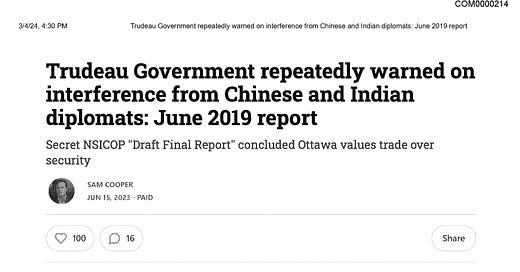Global Affairs Resisted Domestic Election Interference Monitoring Despite 2019 National Security Warnings
OTTAWA, Canada—In a revelation that appears to contradict national security recommendations provided to Prime Minister Justin Trudeau in 2019, Global Affairs Canada (GAC) resisted contributing to domestic election interference and disinformation monitoring, the Hogue Commission heard this week.
Testimony Friday revealed that GAC sought to remove itself from domestic threat monitoring responsibilities in 2023, even as concerns over election interference surged in Canada. This stance emerged despite the "whole-of-government" approach recommended by NSICOP in 2019—first revealed in a report by The Bureau—which found that Canada’s foreign affairs department had been prioritizing trade with China and India over combating foreign interference in Canada.
In a May 2023 email presented to the commission, Tara Denham, head of GAC's Centre for International Digital Policy, advocated for the department’s withdrawal from domestic monitoring.
"We need to continue to socialize the need to review the mandates in SITE with the end objective of removing domestic monitoring responsibility for RRM Canada," she wrote, referring to the Rapid Response Mechanism (RRM) Canada.
Denham emphasized that GAC initially took on this role because no other department had the capacity at the time.
"We had that capacity, but we need to focus on international threats," she testified, suggesting that domestic monitoring responsibilities should be transferred to other departments.
The inquiry into GAC's position followed a June 2023 report from The Bureau, submitted as evidence to the Hogue Commission. The report detailed repeated intelligence warnings that China viewed Canada as a "permissive environment" for its interference activities, as outlined in a 2019 NSICOP document.




